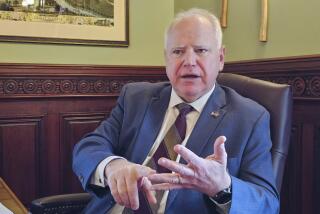Should we evaluate teachers outside of the classroom too?
Should teachers have the freedom to lead private lives we may not all agree with? And should they be able to post controversial tidbits on social networking sites? Jonathan Turley, a professor of public interest law at George Washington University, believes that they should. He took his argument to our Opinion pages Monday in “Teachers under the morality microscope,” writing that teachers shouldn’t be disciplined or fired for activities they pursue outside of work so long as those activities are lawful.
In his op-ed, he wrote: “Most citizens view the end of work each day as a clear line in dividing their responsibilities to an employer from their rights as an individual. While at work, we accept that we must comply with work-related expectations and policies. But when the whistle blows, we consider ourselves our own masters -- pursuing recreation or even legal vices as we see fit.”
So why wouldn’t those same standards apply to teachers?
In our comments board, readers wrote expressing their opposition to Turley’s argument. One reader, edwardskizer, took a sarcastic tone: “Apparently being a role model, like transferring knowledge and helping students to graduate are concepts that are beyond the grasp of many teachers. Sorry for asking for so much...”
Turley understands the reader’s point. “As an educator, I believe that teachers should strive to represent the best role model inside and outside of school. Moreover, most teachers are entirely dedicated to being role models, transferring knowledge and helping students graduate. These are people who have dedicated their lives to education,” he said by way of email on Tuesday. “However, what constitutes a non-role model or ‘disruptive’ is often undefined and highly biased. One teacher was fired for expressing his view on morality while another was fired for a picture with her lawful weapon. Another was fired for a picture holding a drink. Those are not educators who clearly cared nothing about students. They are simply citizens who are living their lives in their own way. They should not have to live with a Damocles Sword dangling over their heads.” But Turley does concede that the cases involving the pornography industry are tougher. And anyway, he says, “The column was written to pose the question of where we should draw the line. The concepts that you mention are not beyond the grasp of these teachers. They chose their careers in teaching precisely because they are dedicated to the concepts. However, they also believe that they have a right to live their lives according to their own values. Students should have role models but they should also understand that teachers are part of a diverse and pluralistic society with different values and lifestyles.”
Another reader, Chuck Kelly, pursued another thread: Shouldn’t public service employees to be held to a higher standard? “When teachers, cops, and city inspectors took on PUBLIC SERVICE jobs it was with the understanding that they gave up certain rights enjoyed by the public at large,” Kelly writes on our comments board. “Universal among those is the right to do whatever they want after work that their employer or the employer’s clients might disagree with. In exchange, they received greater job benefits through civil service protection than most private sector employees with similar skills, mainly standardized systems of pay, advancement, demotions, terminations, health plans and of course retirement benefits.”
Turley holds the opposite view. “I simply do not agree that public employees give up their rights in this way from garbage collectors to jail guards to teachers,” answers Turley. “They have a right to live their lives according to their own beliefs and values so long as they refrain from criminal acts. The mere fact of public employment should not negate their rights to protected speech and association. We did not buy their freedoms with those ‘greater job benefits.’ We bought their skills and their willingness to meet performance criteria on the job. Firing a teacher for taking a picture with a drink is not advancing any particularly public policy. Rather, it is using public employment to create a subset of citizens who must not just work according to our demands but then live their lives according to our values.”
ALSO:
How to tell if your teacher is a leftist
Can giving parents a voice actually improve schools?
More to Read
A cure for the common opinion
Get thought-provoking perspectives with our weekly newsletter.
You may occasionally receive promotional content from the Los Angeles Times.










